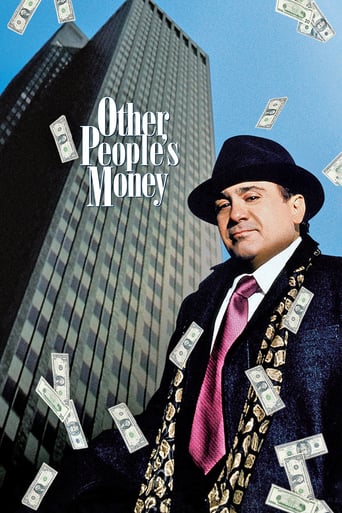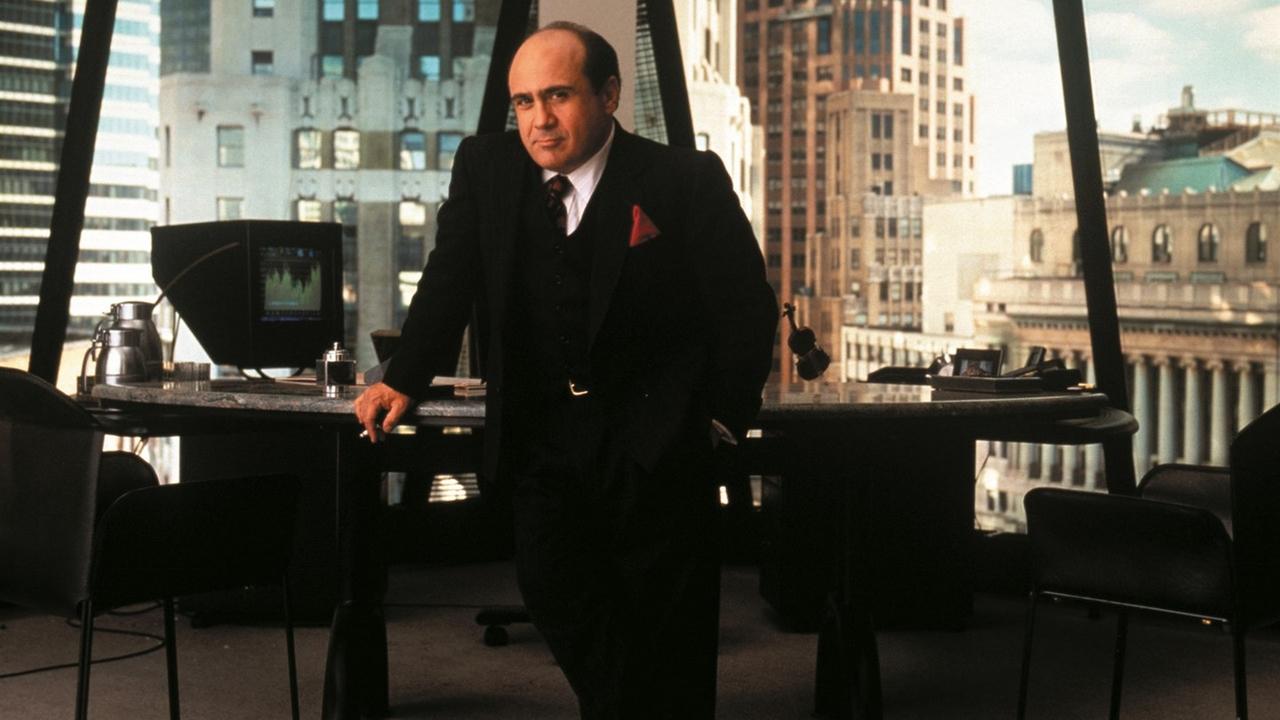Predrag
Other People's Money is a wonderful movie, full of smart dialogue, good music, and a terrific Danny De Vito performance. De Vito is his usual funny, and easy-going self, while Gregory Peck is a strong-willed patriarch. Very good stuff there. The weakest performance is from Penelope Ann Miller, who isn't really convincing as the corporate attorney, but the material is so good that it saves the movie. The movie, above all, presents a balanced take on a fascinating issue: is the hostile corporate takeover an evil act? Although one could argue that a sub-textual ideology is present- in fact, in many ways, the script can be considered a yuletide cautionary tale written by Dickens sans the spectral spirits- it can easily be dismissed; there is never a feeling that the viewer is being spoofed one propaganda or another. The soliloquies rendered by Jorgenson and Garfield at the end form the killer application of the piece. They deliver two diverse, diametrically opposed filters on the same subject, and both participants challenge all of us to come up with a sane, informed opinion regarding it.What's refreshing about the movie is the writer didn't set up a straw man to argue either point view. Both sides present intelligent arguments from believable characters. The movie challenges us that what is rational is not always what feels good. An efficient and productive economy is one that has the ability to change, but there are costs - people get displaced. Where the script fell short and where many in our society lose perspective is that while businesses may die out people are flexible. One's skills can be revamped and applied to more productive pursuits. Instead, however, the scriptwriters concoct a not so believable happy ending. Still, though Other People's Money is probably one of the most honest movies to come out of Hollywood on the topic of capitalism.Overall rating: 9 out of 10.
ShibanPD
Based on Jerry Sterner's stage play of the same name, Other People's Money, rewritten for the screen by Alvin Sargent and directed by veteran Norman Jewison, delivers an entertaining treatise on the practice of hostile corporate takeovers and the tug-of-war between stockholder interests and employee welfare. Danny DeVito plays Lawrence Garfield (a.k.a., Larry the Liquidator), a notorious Wall Street corporate raider, whose most recent target is a New England manufacturer of wire and cable. On the side of the employees' interests is Andrew Jorgensen, the company's leader, splendidly played by Gregory Peck, and his stepdaughter Kate Sullivan (Penelope Ann Miller), whom he hires as his attorney to defend the company against liquidation. Miller is slightly miscast as the seductive, hard-ball playing, small-town-girl-turned-cosmopolitan, but, then again, so is DeVito. He's a tad too likable out of the gate; she's a trifle skewed to the simpler, softer side of the character. Both of them rise to the occasion with such talent and verve that they make their respective roles come off as the ones they were born to play. These are meaty parts, and these two actors have never been better. And you may not predict it, but their on screen chemistry is quite palpable. Jewison shows a nicely developed eye and ear for scene variety and continuity. The writers show a comparable aptitude for scene-to-scene rhythm, balance, and semantic connectivity and contrast. One case of juxtaposition particularly demonstrates this aptitude, while simultaneously punctuating the spectrum of loyalties that spans the film's central conflict. Jorgensen's right-hand man, Bill Coles (Dean Jones), who feels he is owed a "golden parachute" for his years of hard work and dedication, approaches Larry in secret and offers him the right to vote his shares in exchange for a million dollars. Coles has defected to Garfield's side, but he feels guilty about it. "Everybody looks out for their own self-interest," he says to Garfield, looking for some kind of moral reassurance. None is forthcoming. Garfield has already come to that conclusion: survival of the fittest; he is pure capitalism. Shortly after this scene, Jorgensen's wife and Kate's mother, Bea (Piper Laurie), secretly meets with Larry and offers him a million dollars to call off his fight. Garfield can't believe it. She hopes to appeal to his sense of decency. "I don't take money from widows or orphans," Garfield explains. "I make them money." All of this leads to a "proxy bloodbath" in which Larry and Jorgy, in beautifully written and brilliantly delivered speeches, summarize each side of the argument with clarity of position and passionate conviction. David Newman's score is a touch too whimsical for the material, but it fits in with the overly tidy, "happy" Hollywood ending. Then again, the resolution isn't impossible. Larry makes it clear that he doesn't care whether they make wire and cable or airbags, or whether they lose their jobs or keep them, as long as he makes money. And he does, even if it's other people's money.
Petri Pelkonen
Lawrence Garfield loves money.Soon Larry loves also a woman.That woman is Kate Sullivan.But if he wants to win her heart he has to become less obnoxious.Norman Jewison's Other People's Money (1991) tells a fine story.The little big man Danny DeVito is the best person to portray the lovable bad guy Larry the Liquidator.Penelope Ann Miller is a perfect player of the opposite sex.The late great Gregory Peck does a great job, as he always did.He plays the part of Andrew Jorgenson.Piper Laurie is awfully great as Bea Sullivan.Dean Jones does very good job as Bill Coles.This movie is full of well written scenes.Overall Other People's Money is a good comedy with some serious stuff.
theowinthrop
Danny DeVito's performance as Larry "the Liquidator" Garfield is a solidly crafted performance of a big time, clever Wall Street operator. The film came out in the early 1990s, and the character was the type of person who was active at the time who bought up fading companies to sell off the assets. A similar character would be Richard Gere's billionaire in PRETTY WOMAN, who is able to look back with satisfaction at buying up the company his father (who deserted Gere and his mother) built and selling it apart while his father watched helplessly. Another example is Michael Douglas' "Oscar" performance as "Gordon Gecko" in WALL STREET. The three actors show this type of tycoon at his best and worst. Douglas, of course, with his "Greed is Good" speech showed the worst of it. Gere (with the help of Julia Roberts) manages to regain his sense of ethical strength and becomes more willing to not be a Wall Street looter. But best of the three was DeVito. Handicapped at being a short, bald, pudgy man (albeit with a brain), and not attractive like Gere or Douglas, Danny manages in this film to show the positive flip side of his "liquidation" schemes and win our support as Douglas never would. One may of course remain skeptical about DeVito's altruism, as he does admit liking to make money, but the overwhelming common sense of his speech explains that progress and economic realities dictate the world of big business as much as the personalities of the operators.In OTHER PEOPLE'S MONEY Danny has decided to buy as much of the stock of a New England cable manufacturing company as he can. The company is breaking even or less every year, and is actually worth more for it's individual assets than for it's unified worth. Unfortunately, in a situation that Frank Capra would have been at home with, the firm is the largest employer in the New England town it is located in. Many of the residents of the town work in the factory. The head of the factory is Andrew Jorgenson (Gregory Peck - everyone's favorite spokesman for the common man after Henry Fonda and Jimmy Stewart left the scene). Peck is the sort of man who anyone in the plant would come to if they had some personal problem that needed adjustment that effected the business. Peck is paternalistic business at it's best.But that's just the problem - Calvin Coolidge once made a truism: "The business of America is business." He meant that Americans were hard working people who would go into all types of business to earn a living. But earning a living includes earning a profit, and it does not mean supporting a business that is increasingly becoming an unofficial charity for a factory town.The problem for DeVito is that his raider reputation precedes him. He also finds that Peck's lawyer Kate Sullivan (Penelope Ann Miller) is very attractive. DeVito's finding that his campaign to take over the factory is interfering (understandably) with his attempts to romance Miller. Also, on the sidelines, is a problem with a type that DeVito finds useful if distasteful. Peck's associate Bill Coles (Dean Jones) is a shareholder who might support Peck but is weak enough to sound out DeVito about voting with his side. It's interesting watching DeVito's face when dealing with Jones - he is very mild but his face does register disgust and dismissal (subsequently so does Peck's).The high point is the stockholder's meeting. Peck gives his best speech about the importance of the company to the town. He talks about how business opportunities are bound to turn around shortly. He gives the type of speech that Frank Capra would have been proud of in MR. DEEDS GOES TO TOWN or IT'S A WONDERFUL LIFE (think of George Bailey's speech to mollify the townspeople during a run on the savings and loan). When you hear the sincerity of Peck's well remembered voice, you feel he will carry the day.But he doesn't. Instead, DeVito wins. His speech is not the "Greed is Good" crap that Douglas espouses, although the profit motive is stressed. DeVito points out that there is no real chance that the firm will overcome foreign competition in fiber-optics. Furthermore, even if there was such a chance it would be infinitesimal. DeVito goes into the matter of why people invest money - it's to make money, and not to be philanthropic with the money. He points out that it is sad that the effect of the closing of the factory hits the town, but under the circumstances it can't be helped - it's inevitable. But at least now the company's assets can be sold off, and they will produce a large profit. As DeVito points out, he's proud of his name "the liquidator", and he feels he is the best friend of every shareholder in the firm at that moment. Finally he discusses the significance of the last buggy whip company. It made the finest of all buggy whips, but people had no further use for them in the age of the automobile.It's a straightforward, honest, and eloquent defense of capitalism - a perfectly respectable variant to the Gecko speech in WALL STREET. The film does end in a successful compromise, but it's nice to see DeVito coming across as fully in the right for a change.



 AD
AD



